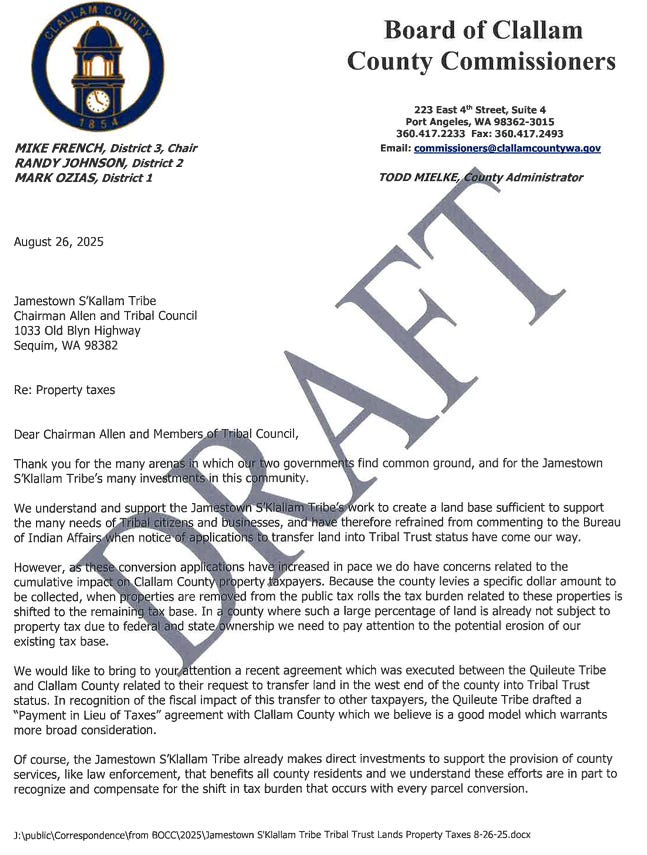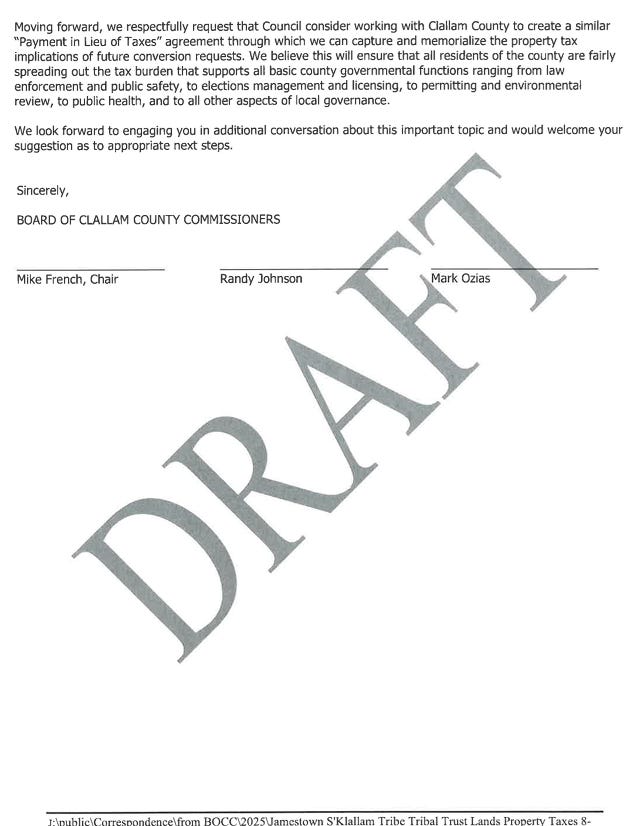For more than a decade, Clallam County’s commissioners have declined to respond to federal requests for input on tribal land-to-trust conversions—decisions that remove property from the tax rolls and shift the burden to others. After pledging a public work session with the Jamestown Tribe on tax issues, commissioners instead are sending a letter of praise with little follow-through. Taxpayers deserve open discussion and clear representation when decisions affect the county’s future.
Every time a tribe applies to have land converted into federal trust status, the Bureau of Indian Affairs (BIA) invites our county commissioners to comment on how the change will affect Clallam County—through loss of property tax revenue, zoning changes, and other impacts.
Yet our county commissioners have not responded to a single request in at least ten years. Not one.
Broken promises
In January, after repeated public questions about whether tribes contribute fairly to lodging tax, property tax, and other obligations that every other business or homeowner must pay, Commissioner Mark Ozias said:
“We are working on setting up a work session conversation, another public conversation, with the Jamestown Tribe about a variety of tax-related issues — property tax-related issues, lodging tax-related issues, etcetera. So, we’ve been in communication with the Tribe. I expect that to happen sometime in the first quarter, but I don’t have a day yet, and that will be the best opportunity for hopefully a wide-ranging conversation about tax-related issues as it relates to the Tribe and to other Tribes.”
Commissioner Ozias mentioned that the meeting would take place during a Monday work session, allowing the public to observe. However, the first quarter came and went. No meeting. No explanation. No accountability.
Last week, Commissioner Ozias—who also serves as the Board’s tribal liaison—hinted that something was finally happening. And it did. But instead of the promised work session, with public discussion in front of the citizens of Clallam County, the commissioners simply drafted a letter.
A letter. After seven months of waiting, taxpayers got a letter.
The Commissioners’ letter: praise first, accountability later
The letter to Jamestown Chairman Ron Allen and the Tribal Council begins with glowing praise for tribal investments. Then, in what is perhaps the most revealing admission yet, our commissioners wrote:
“We understand and support the Jamestown S’Klallam Tribe’s work to create a land base sufficient to support the many needs of Tribal citizens and businesses, and have therefore refrained from commenting to the Bureau of Indian Affairs...”
Think about that. Our elected commissioners openly admit they have withheld comments to the federal government because they “support” the Tribe’s efforts to expand its land base. But they were not elected to represent the interests of a sovereign tribal government—they were elected to represent the people of Clallam County.
Meanwhile, the Jamestown Tribe, with just 209 local citizens, reported $86 million in revenue last year. How much land is “sufficient” to support its citizens and businesses? And why should our county leaders refuse to even raise questions with the federal government?
Shifting the tax burden
To their credit, the commissioners’ letter does acknowledge the obvious:
“We do have concerns related to the cumulative impact on Clallam County property taxpayers… when properties are removed from the public tax rolls the tax burden related to these properties is shifted to the remaining tax base.”
That is exactly the issue. Every acre converted into trust status is an acre permanently removed from the tax rolls, leaving homeowners and small businesses to pick up the slack.
The commissioners point to an agreement with the Quileute Tribe, in which land was taken into trust, but the Tribe has agreed to make “Payment in Lieu of Taxes” (PILT) contributions. They say it’s a model worth considering. But instead of pursuing such agreements years ago, they’ve remained silent.
The myth of tribal “contributions”
The commissioners’ letter goes on to thank Jamestown for “direct investments to support the provision of county services, like law enforcement, that benefits all county residents.”
But here’s what they don’t mention: those law enforcement contributions come from a federal grant—funded by taxpayers. If that grant ever disappeared, the Tribe would have no obligation to continue. In other words, your tax dollars go to Washington D.C., are handed to the Tribe, and then recycled back to the county. And your commissioners say thank you on your behalf.
Business vs. government
The Jamestown Tribe provided its own “Tribal Governance Fact Sheet” in February. It outlines the many benefits of trust land status:
New Market Tax Credits
Indian Employment Tax Credits
Tax-Exempt Financing
Discounted Leasing Rates
Federal Contracting Preferences
Foreign Trade Zone Duty Deferrals
State/County Land Use Exemptions
Accelerated Depreciation on reservation business property
These are massive business advantages—not government functions.
The Tribe also boasts of employing 1,100 people, paying a $4 million monthly payroll, spending $6.8 million with local vendors, and paying $2.2 million to local governments in 2024. Those are certainly impressive business accomplishments. However, businesses all across Clallam County provide jobs, pay vendors, and contribute to government coffers—without the special exemptions and tax shields that tribes enjoy. Local businesses also do it without accolades from our county commissioners.
The bottom line
The Jamestown Tribe, like other sovereign tribes, has every right to pursue its own interests. But our county commissioners were elected to pursue ours. For more than a decade, they have refused to provide comment to the federal government, broken promises of transparency, and substituted a letter for a real public conversation.
Meanwhile, the tax base shrinks, the burden shifts to working families, county leaders say they are “supporting” someone else’s government, and this November, they will ask you to raise your property taxes.
Respect for tribes and their history is important. But so is respect for the citizens who pay the bills. It’s time for our commissioners to stop dodging, start representing, and finally speak up.
You can read the letter, the agreement with the Quileute Tribe, and the Jamestown Tribe’s fact sheet by clicking here and scrolling to page 7.














